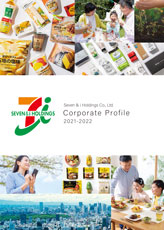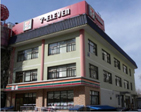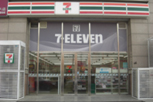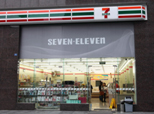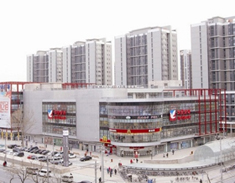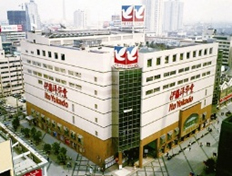- Sustainability
- Statement
- Message from the Representative Director & Executive Chair (Kaicho)
- Basic Policies of Sustainability Initiatives
- Sustainability Management
- Stakeholder Engagement
- Business Partners
- Seven & i Holdings Material Issues
- Compliance
- Information Security and Personal Information Protection
- Human Rights Initiatives
- Human Capital Initiatives
- Responses to Climate Change (TCFD) and Nature (TNFD)
- Response Based on the Taskforce on Climate-related Financial Disclosures (TCFD)
- Taskforce on Nature-related Financial Disclosures (TNFD)
- Social Contribution Activities
- Disaster Reconstruction Support
- Disaster Assistance
- Overseas Initiatives
- Sustainability Data Book
- External Recognition and Awards
- SASB/GRI Index
- Index for Researchers
- Keyword search
- Editorial Policy
- Social
- Environment
China
Seven & i Holdings maintains convenience stores, super stores and other establishments throughout China.
| Convenience Store Business | |||
|---|---|---|---|
|
SEVEN-ELEVEN (BEIJING) CO., LTD.
|
SEVEN-ELEVEN (TIANJIN) CO., LTD.
|
SEVEN-ELEVEN (CHENGDU) Co., Ltd.
|
|
|
Net sales (¥ Million) |
17,983 | 3,783 | 4,204 |
| Number of stores | 175 | 60 | 66 |
| Established | January 2004 | November 2012 | December 2010 |
| Super Store Business | ||
|---|---|---|
|
Hua Tang Yokado Commercial Co., Ltd.
|
Chengdu Ito-Yokado Co., Ltd.
|
|
|
Net sales (¥ Million) |
31,814 | 70,650 |
| Number of stores | 6 | 6 |
| Established | September 1997 | December 1996 |
- *
- Exchange rates (average for the period): CNY1=¥17.18
- Figures are for the fiscal year ended December 31, 2014.
- Number of stores is as of December 31, 2014.
Convenience Store Business
History
In 2004 Seven-Eleven Japan began full-scale development of convenience store operations in Beijing, China. Afterwards, stores were further expanded to and Tianjin, Chengdu, Qingdao and Chongqing.
National policy in China for the modernization of cities has resulted in a reduction in the number of street stalls and other traditional Chinese vendors. Amid this change, Seven-Eleven is dedicated to contributing to society and supporting urban lifestyles as a convenient and nearby infrastructural network that provides safe and reliable foods.
Customers
Providing Safe and Reliable Products
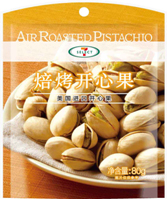
Private-brand products
In China, where concerns over food safety and integrity have been mounting, we work to provide safe and reliable products by leveraging quality management and product development capacities cultivated in Japan.
For the Group's private-brand products in China, strict standards are applied in selecting ingredients, and processing plants that maintain high quality levels are selected through a screening process based on whether they have experience exporting to Japan and other criteria.
Some of China's food safety laws mandate even more stringent standards than Japan, and the Wang Yang Factory, a dedicated production plant of SEVEN-ELEVEN (BEIJING) that has been in operation since May 2012, complies with these standards. The factory is also involved in helping revitalize the regional economy by purchasing ingredients from local suppliers and hiring local residents. Moreover, food ingredients that are not needed are used at pig farms as feed to help ensure that resources are fully utilized. At a second dedicated plant, which has been in operation since March 2014 supplying SEVEN-ELEVEN (BEIJING), we work to provide high-quality products, such as bread produced using natural yeast, while also conducting our usual safety and integrity initiatives. Moreover, SEVEN-ELEVEN (BEIJING) is working to reduce use of trans-fatty acids, which is said to increase the risk of heart disease, in its room-temperature bread in order to meet the needs of health-oriented customers.
SEVEN-ELEVEN (TIANJIN) has introduced a "cold chain" low-temperature logistics network for transporting and storing unheated vegetables used in salads at cold temperatures after harvest in order to provide fresh food to customers. The vegetables are not exposed to temperature changes, which prevents them from deteriorating in quality and makes it possible to maintain their freshness over a longer period of time.
At SEVEN-ELEVEN (CHENGDU), Chengdu Yonglida Food Co., LTD, a major supplier of cooked rice products, has concluded a consulting agreement with Warabeya Nichiyo Co., Ltd., a business partner of Seven-Eleven Japan, to conduct training to impart expertise on sanitation management methods used in Japan and to incorporate Hazard Analysis and Critical Control Points (HACCP) management methods into food sanitation management, as the company focuses on further improving quality.
Improving Customer Satisfaction
The three companies are working to improve quality and services from the customer's standpoint by establishing customer feedback desks and collecting customer feedback. Stores also conduct customer surveys, and in 2014, SEVEN-ELEVEN (BEIJING) received responses from 1,000 people, SEVEN-ELEVEN (TIANJIN), from 862 people, and SEVEN-ELEVEN (CHENGDU), from 1,864 people. This customer feedback is used in boxed-lunch product improvements, new product development and other initiatives.
In order to further improve customer service, the three companies conduct training and have also established award programs for employees. For example, SEVEN-ELEVEN (BEIJING) started a new program in 2014 to honor exceptional part-time employees for friendly service and other accomplishments. Employees are selected based on store recommendations once every three months by HR and training divisions after their work performance is verified and then receive an award at a store managers meeting held at the Head Office.
In addition, SEVEN-ELEVEN (CHENGDU) checks the personal appearance of all store managers and assistant store managers and conducts verbal etiquette drills at meetings of store managers held each month. There is also a paid program for franchise stores. It is divided into three levels, store staff, shift leaders, and store managers, and training is conducted on the Four Basic Principles (Friendly Service, Cleanliness, Freshness Management, and Product Assortment), as well as Tanpin Kanri (item-by-item management), job assignments and other subjects in line with each level's job duties.
Local Communities
【Funds Raised】
| 2012 | 164,884 yuan |
| 2013 | 112,406 yuan |
| 2014 | 147,755 yuan |
In-store Fundraising
Since November 2006 donation boxes have been in place at Seven‐Eleven Beijing stores to collect funds for donation to the Beijing Afforestation Foundation, a governmentally recognized environmental conservation organization. The foundation uses donations from citizens to plant trees in anti-erosion tracts in Beijing and surrounding areas so as to protect against sandstorms and desertification.
Cooperate with Work Experience for Young People
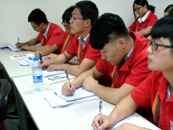
SEVEN-ELEVEN (TIANJIN) actively takes part in career experience programs for junior college and university students. In 2014, 65 students were accepted and participated in a tailored training curriculum that combined job experience and lecture classes. Participants performing well on the job earned promotions just as if they were full-time employees, which provided the students added motivation and a sense of accomplishment.
SEVEN-ELEVEN (CHENGDU) Activities
SEVEN-ELEVEN (CHENGDU) conducts a variety of social contribution activities that have earned public accolades. In 2014, the company received an award for contribution to the public good from the Chengdu Retail Chain Association for the second year in a row.
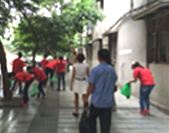
【Cleanup Activities】
Since 2012 Seven-Eleven Chengdu has recognized July 11 and November 7 as "7-11 Days," with activities geared toward contributing to local society and maintaining clean and beautiful city environments. On July 11, 2014, all Head Office employees cleaned and picked up trash around store locations.
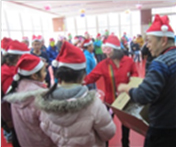
【Support for Children with Mental Disabilities】
Since 2013, the company has provided support for Benevolence House, a home for children with mental disabilities. In May 2014, six employees helped clean the facility and donated a stereo system and pens for 100 children. In December, three employees participated in a Christmas party and handed out Santa Claus hats, cookies, Christmas cards, and other gifts.
Employees
Skills Development
In continuing to expand our network of stores in China, it is essential that we hire and train local employees. The three companies are focused therefore on raising the communication abilities of employees and training them to be able to think and act with autonomy.
Operations Field Consultants (OFC) play an important role in connecting the Head Office with franchise store owners. They serve as store management consultants that provide multifaceted advice to franchise stores on overall management, including ordering, product assortment, and employee training. OFC candidates first gain store experience at training stores and learn the fundamentals of store management, which include the Four Basic Principles; unit control, employing, training, assigning and evaluating staff; and management financial figures. After the candidates become OFCs, additional training is conducted to hone their job skills. For example, at meetings of all OFCs held each week, company policies are shared and training is conducted on how to communicate efficiently with franchise stores and other issues.
In addition, Head Office employees also receive training to increase their business execution capabilities. In 2014, SEVEN-ELEVEN (BEIJING) strengthened training division functions and currently conducts regular training for employees in each division. At SEVEN-ELEVEN (TIANJIN), etiquette training was launched in 2014 to improve the negotiating abilities of employees responsible for new store establishment. At SEVEN-ELEVEN (CHENGDU), training seminars are held for new store managers and assistant store managers to learn the requirements of their respective positions (over five days for new store managers, three days for new assistant store managers). Training is also held for Head Office employees when they join the company, including in-store sales experience.
Raising Employee Motivation
SEVEN-ELEVEN (TIANJIN) and SEVEN-ELEVEN (CHENGDU) instituted internal hiring programs in the second half of 2014 in order to further raise employee motivation. Store employees are recruited as candidates on a priority basis by Head Office divisions seeking to add personnel and are selected on the basis of divisional and HR interviews. In 2014, three people at SEVEN-ELEVEN (CHENGDU) and three at SEVEN-ELEVEN (TIANJIN) started new positions at the Head Offices through this program. Employee trips are also held every year to foster a sense of solidarity among employees.
Fair Evaluation and Treatment
At all three companies both monthly interview evaluations and yearly evaluations are carried out for employees. During monthly interviews the employees meet with their direct supervisor to discuss achievement of individually set goals. During yearly evaluations, self-assessments are first reviewed by the direct supervisor before a review by and interview with a secondary, higher-level supervisor. Regular training is carried out for managers on monthly evaluation methods, and on determining pay in accordance with these evaluations.
Employee Voices

Seven-Eleven Beijing
HR Division
Manager
Chen lijun
SEVEN-ELEVEN (TIANJIN) seeks to train personnel to think and act proactively from the customer's perspective. An internal hiring program was started in 2014 as one means of achieving this. The program has four benefits, which are listed below. Going forward we intend to further raise the accuracy of personnel decisions made through the program by implementing objective evaluation tools.
- 1)
- The program enables identification of personnel with store operation and management skills needed by the company and provision of needed staff for divisions with shortages.
- 2)
- Employees have the chance to advance to positions that match their own career plans, which makes work more mentally satisfying and raises motivation.
- 3)
- Existing human resources can be utilized efficiently and effectively.
- 4)
- Expenses related to recruitment and training can be reduced.
【Employee data (as of December 31, 2014) 】
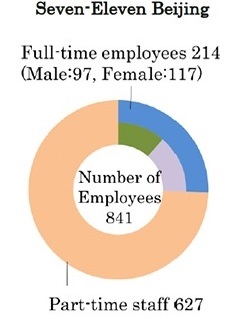
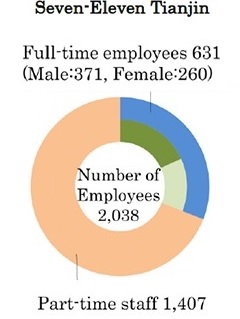
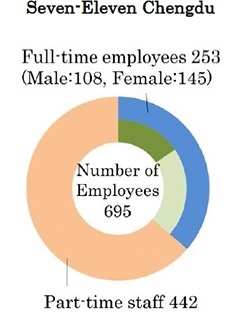
| Seven-Eleven Beijing | Seven-Eleven Tianjin | Seven-Eleven Chengdu |
| Employees with disabilities | ||
| 2.1% | 2.8% | 2.7% |
| Women in management position (excluding executive officers) | ||
| 54.2% | 34.8% | 48.8% |
Environment
Energy Conservation
In China there is growing concern regarding air pollution and other environmental problems, and the government has also been strengthening environmental regulations. The three China companies are promoting energy conservation initiatives by installing energy efficient facilities and raising employee awareness, among other activities.
For example, LED lights are used for store signboards and lighting, and the lights in chilled cases and refrigeration equipment are also being changed to LEDs. In addition, store air conditioners and refrigeration equipment are successively being upgraded to efficient inverter models. Meanwhile, awareness-raising for employees includes seasonal instruction at meetings on room temperature management to avoid excess heating and cooling, and the companies continue to remind employees to turn off unnecessary lights in stockrooms, restrooms, and other areas.
In November 2014 China and the United States announced the U.S.-China Joint Announcement on Climate Change, which includes reduction targets for the greenhouse gas emissions that cause climate change. Acting in the wake of this announcement, the Beijing government in 2015 launched a CO2 emissions credit trading scheme. As a company subject to the scheme, SEVEN-ELEVEN (BEIJING) quickly came into compliance by purchasing CO2 emissions credits on the market in the amount to make up the shortfall for its target during the applicable period (January-December 2014). The company's fast response earned high praise from the Beijing Municipal Commission of Development and Reform.
【Environmental data】
Seven-Eleven Beijing
| 2011 | 2012 | 2013 | 2014 | |
| Stores | 147 | 200 | 150*** | 175 |
| Electricity consumption (MWh) | 13,216 | 20,675* | 19,648 | 19,366 |
| Water consumption*(1,000 m 3 ) | 55 | 82** | 69 | 73 |
Seven-Eleven Tianjing
| 2013 | 2014 | |
| Stores | 56 | 60 |
| Electricity consumption (MWh) | 8,472 | 6,164 |
| Water consumption*(1,000 m3 ) | 21 | 20 |
Seven-Eleven Chengdu
| 2014 | |
| Stores | 61 |
| Electricity consumption (MWh) | 7,319 |
| Water consumption*(1,000 m3) | 28 |
- *
- Due to government restrictions on gas usage, in-store kitchens have converted from gas to electricity use. As a result, electricity usage increased in 2012.
- **
- The data collection method was changed.
- ***
- Seven-Eleven Beijing stores within Tianjin City were transferred to Seven-Eleven Tianjing. As a result, the number of stores as of the end of the fiscal year decreased greatly in comparison to 2012.
Super Store Business
History
Ito-Yokado responded to a 1996 appeal from the Chinese government, establishing Hua Tang Yokado Commercial
Co., Ltd. in Beijing in September 1997. The company also responded to an appeal from Chengdu City in the Sichuan Province, establishing Chengdu Ito-Yokado Co., Ltd. in Chengdu City in December 1996.
In addition to the safe and reliable foodstuffs and meticulous customer service cultivated in Japan, these companies strive to offer stores from, by and for Chinese people. This includes product and service lineups tailored to the needs of Chinese customers, and local products and staff sourced from within China.
Customers
Providing Safe and Reliable Products
Hua Tang Yokado Commercial and Chengdu Ito-Yokado are responding to increased concerns over food safety and reliability by leveraging expertise cultivated in Japan to ensure rigorous quality management. In addition, Chengdu Ito-Yokado obtained ISO 9001 certification in 2007 for the purpose of further clarifying and standardizing work processes.
For employee training, each month from January to July 2014, Hua Tang Yokado Commercial sent out information in the form of notices and rules related to expiration date management and checking requirements under the new trademark law. In addition, four training sessions were held on compliance with consumer protection laws, textile-related knowledge, product labeling at stores, and other topics, with a total of 180 employees participating. At Chengdu Ito-Yokado, eight training sessions were held in 2014 and a total of 496 employees participated. They included training for new employees, training on production management conducted by outside instructors, and training on quality control led by quality control specialists.
Products to Meet Customer Needs
The companies are working to provide products that accommodate the diverse needs of customers.
Chengdu Ito-Yokado sells the "Foods with Traceability" products. Using a dedicated website, customers can learn where, how and by whom the product was raised. The concept has been warmly received, in particular by customers with special concerns over food safety and reliability such as pregnant customers or those with children. As of December 31, 2014 the lineup included 57 vegetable items, 7 fruit items and 19 pork items. In 2015 rice and fish items were also introduced to the lineup. Hua Tang Yokado Commercial also offers meat items for which customers can search traceability information using in-store terminals.
Hua Tang Yokado Commercial has expanded the number of organically-grown food items being handled, and 60 vegetable items and 25 items we sold, including chicken meat, eggs, soy sauce, sesame oil and milk. It also handles 132 food items with low residual pesticides called "Green Foods" (foods certified by the Chinese government as being below a set level).
In addition, to meet the needs of its health-conscious customers Hua Tang Yokado Commercial sells sugar-free beverages, desserts, and other products in a special section for sugar-free products. Chengdu Ito-Yokado sells mayonnaise and condiments with only half the usual amount of fat, as well as low-fat milk. These products have been a hit with customers.
Development of Stores and Facilities That Can be Used with a Sense of Security
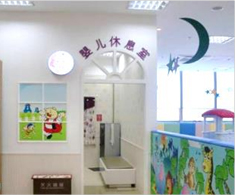
Baby Lounge
The companies have been working to improve their facilities so that diverse customers can shop comfortably, including customers with children and customers with disabilities. For example, entrance ramps and restrooms for people with disabilities are being added, and baby lounges and child play areas are being set up for customers with children.
Improving Customer Satisfaction
【Contacts from customers in 2014
(Hua Tang Yokado Commercial) 】
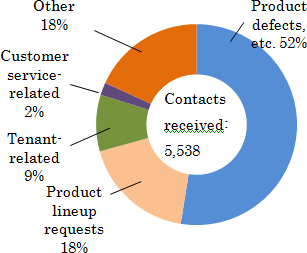
In order to improve products and services from the customer's standpoint, all stores have set up customer feedback boxes and the Head Office has established Customer Feedback Desks to take customer feedback via telephone and the company's website. Feedback received from customers is shared throughout the company and used to make improvements.
Hua Tang Yokado Commercial holds weekly meetings with persons in charge of customer feedback from each store. Since 2014, feedback received from customers is turned into posters each month (after redacting the customer's personal information) that are then displayed in stores along with the store's response and measures taken.
At Chengdu Ito-Yokado, the Customer Satisfaction Committee comprising executive staff from all stores meets every month to determine company response policies based on customer feedback that is compiled monthly.
In addition, customer questionnaires are administered twice yearly at each store to obtain feedback from customers on the products and stores.
Commitment to Suppliers
Our basic policy is to procure products locally. Hua Tang Yokado Commercial purchases 90% of apparel products, 95% of household goods, and 90% of food products from within China, and Chengdu Ito-Yokado does the same for 97% of apparel products, 98% of household goods, and 98% of food products.
In addition, in order to ensure fair trade practices in all areas, Hua Tang Yokado Commercial conducts training for buyers and awareness-raising for store management-level employees. For suppliers as well, the company explains Ito-Yokado's policies, including its ban on bribery, at gatherings with business partners.
Local Communities
Donations
Chengdu Ito-Yokado President Tomihiro Saegusa was appointed Deputy Chairman of the Chengdu Next-Generation Support Fund, which was established in December 2014, and the decision was made to donate CNY 3.0 million to the fund, with CNY 1.0 million donated for the first year's portion. The fund provides and supports a variety of exchange activities needed for sound youth development. In 2014, Chengdu Ito-Yokado's social contribution expenditures totaled CNY 1,182,858.
Volunteer Activities
The companies are members of the local community, and employees strive to actively participate in volunteer activities. For example, Hua Tang Yokado Commercial conducts clean-up activities around its stores every day. In 2014, it also partnered with a non-profit organization in a campaign to encourage citizens to obey traffic signals. Chengdu Ito-Yokado also holds a cleanup around all its stores once a month.
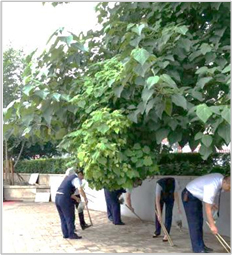
Cleanup in progress
(Hua Tang Yokado Commercial)
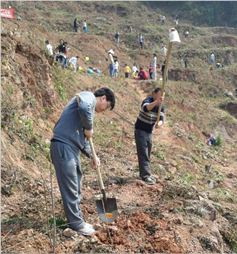
Planting trees
(Chengdu Ito-Yokado)
Employees
Promoting Chinese Employees
With the goal of creating stores that are for Chinese people and by Chinese people, the companies are focused on hiring locally. As of February 28, 2015, Hua Tang Yokado Commercial had five Chinese store managers at its stores, and 94% of management positions at the manager level and above, except for executives, are held by Chinese employees. At Chengdu Ito-Yokado, Chinese employees have been hired for all store manager positions and Chinese employees account for 96% of management positions at the manager level and above.
Workplace promotion for women in China has also been improving. Women account for 57% of management at Hua Tang Yokado, and 58% at Chengdu Ito-Yokado.
【Employee data (as of December 31, 2014) 】
| Hua Tang Yokado Commercial | Chengdu Ito-Yokado | |
| Fulltime employees | 1,051 | 3,130 |
| Part-time staff | 426 | 113 |
|
Average length of service (full-time employees) |
8 years 4 months | 4 years 8 month |
| Percentage of Chinese | 99% | 99% |
|
Percentage of executive Chinese in management positions |
94% | 96% |
|
Percentage of women in Management positions |
57% | 58% |
|
Percentage of employees with disabilities |
2.3% | 1.48% |
Skills Development
Training programs have been established and a variety of contests and awards programs introduced for employees to compete with each other and demonstrate their own abilities to the fullest.
Chengdu Ito-Yokado introduced a managerial employee training program featuring outside instructors in 2013 to raise communication ability and hone leadership skills. In 2014, 27 employees participated, and it served as an opportunity for them to reaffirm their own training responsibilities toward their staff. Also, in 2014, the company focused on building the Chengdu Ito-Yokado Job Training Institute Net Platform for employee training. In addition to existing training videos on fresh food processing, visual merchandising (VMD), and hygiene management, videos were also created with the management team explaining management policies and for customer service training, and other topics, to allow employees to study these subjects online.
【Major competitions and awards at Hua Tang Yokado Commercial】
| 1, Results presentations |
Held once every six-month period Participants report on individual and department achievements in customer service, sales promotion, cost controls and environmental improvements, with the most exceptional examples receiving awards. |
|---|---|
| 2, Distinguished employee awards | An award for exemplary employees, partners and tenant employees who contribute significantly to the company. |
| 3, Sales skills contest | Stores compete against each other in areas such as increased holiday sales, with awards given to the top three stores. Store-by-store awards for excellence in five fields. |
| 4, Business improvement proposal presentations | Proposals for business improvements are solicited, with one person selected from each store/department to present their proposal. |
Employee Voices
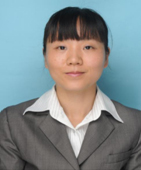
Chengdu Ito-Yokado
Gao xin Store
Management Division
Service Counter
Manager
Fu Yong Hong
2014 Produce Presentation, 3rd Place
I am very happy that the company has recognized our efforts. This award is thanks to the ongoing efforts of all team members and I'd like to express my appreciation to them.
The service counter is the department that is always directly handling customer requests. Moreover, raising employee motivation is indispensable to satisfying customers.
This year, in proposing collaboration events between sales areas and the service counters, we purchased books and researched technologies, and the members came up with their own ideas. These included proposals on negotiations with suppliers and materials, so for employees, it was an exciting, fun job that felt very worthwhile.
We plan to share our successful examples with other stores as well.
Going forward, as we seek to further improve customer satisfaction, we intend to provide value-added services to customers while working to raise employee motivation so that they engage proactively in their jobs.
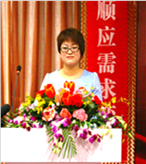
Hua Tang Yokado
Commercial
You anmen Store
Women's Department
lagogo tenant store
manager
Tang Han Hua
2014 Results Presentation, 1st Place
The award recognized my understanding of company policies and analysis of issues from the customer's perspective based on the Women's Department's overall performance. In particular, I received recognition for my analysis based on the proposition that: When customers are not satisfied it is because I am not providing good products or good service.
At the results presentation, I conducted a presentation entitled "Deeply Digging Into Issues, Responding Properly and Rigorously Carrying Out Fundamentals Always Leads to Success." The fact that my thorough implementation of basics that should always be carried was one of the reasons I received the award. I am sincerely grateful to the staff, who work hard at their jobs every day as well as for guidance from store managers.
By more fully sharing information with the head office going forward, we intend to develop the products customers want and provide the best possible service.
Athletic Meet to Foster Employee Unity
Since 2011 Chengdu Ito-Yokado has held a yearly athletic meet for all employees and tenants. Each store forms a team, fostering employee unity by competing in team competitions and cheering each other on. There is also participation from partner company executives and local customers, which helps to foster interaction with these groups.

Environment
Energy Conservation
Concern over air pollution and other environmental problems is growing in China, and the government is also strengthening regulations. Hua Tang Yokado Commercial and Chengdu Ito-Yokado are working to reduce energy consumption by installing energy efficient facilities and raising the awareness of employees, among other initiatives.
Hua Tang Yokado Commerical has converted lights at four stores to LED: the Ya yun cun Store, Fen tai bei Lu Store,
Da xing Store, and Shi Li Pu Store. This is projected to reduce annual energy consumption by approximately 4.0 million KWh. In addition, sales area temperature control is being rigorously conducted as the company also works to reduce energy consumption related to its air conditioning systems. Chengdu Ito-Yokado reduced its electricity use by 3% in 2014 compared to 2013 to 75,197 MWh through installation of LED lighting at the Chun xu and Shuang nan stores. In addition, gas usage dropped dramatically, to 198,000 m3 , due to the usage of food and beverage tenants being excluded from the scope of calculations.
In addition, to raise awareness among employees, Hua Tang Yokado Commercial, as an initiative of the Environment Subcommittee, holds study sessions every month on energy conservation with around 20 department managers from store management divisions. Stores and the Head Office turn off lights at lunch breaks and when employees are away from their desks and turn off copiers, printers, and other office equipment at the end of the day. Chengdu Ito-Yokado also conducts energy-conservation initiatives such as putting up electricity and water conservation posters at offices and other locations, and reminding employees at meetings and morning addresses to turn off the lights when leaving a room. It has also established an energy conversation project and has set up a regular cycle to analyze energy consumption at stores each month and make improvements for the issues that are identified.
【Hua Tang Yokado Commercial environmental data】
| 2011 | 2012 | 2013 | 2014 | |
| Stores | 8 | 8 | 9 | 6 |
| Electricity consumption (MWh) | 55,847 | 54,609 | 56,232 | 41,738 |
| Water consumption (1,000m3 ) | 919 | 894 | 899 | 812 |
| Gas consumption (1,000m3 ) | 413 | 360 | 359 | 309 |
【Chengdu Ito-Yokado environmental data】
| 2011 | 2012 | 2013 | 2014 | |
| Stores | 5 | 5 | 5 | 6 |
| Electricity consumption (MWh) | 61,378 | 84,226 | 77,169 | 75,197 |
| Water consumption (1,000m3 ) | 496 | 602 | 645 | 198 |
| Gas consumption (1,000m3 ) | 571 | 674 | 761 | 897 |

